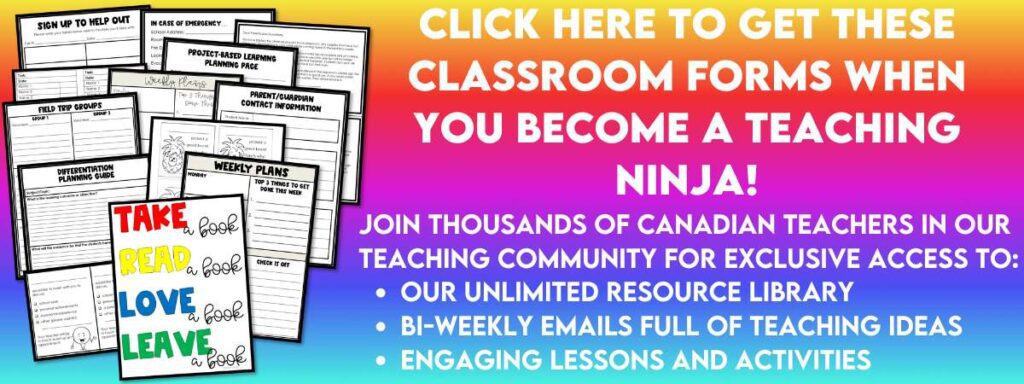Congratulations! You got your first teaching job and are now an elementary school teacher. All that hard work has paid off and you are gainfully employed in your vocation (or calling or job to pay the bills-your choice). Now the real work begins. But don’t panic. We’ve been there! Read what you need to know to get your new job started off on the right foot.

Celebrate Your First Teaching Job
Don’t forget to give yourself a pat on the back. You’ve worked hard to get here and you are entitled to be proud of your accomplishment. You will always remember your first teaching job and hopefully, you’ll have many years of different teaching experiences.
When I got my first teaching job, I was handed a set of keys and shown to a classroom. I remember standing in a completely empty room so happy that I finally had a teaching job. The second emotion was fear. Holy crap! I got hired ONE DAY before students were scheduled to start. Kids would be in my classroom in 18 hours. I didn’t even have a desk. So what did I do?
Nothing. I did nothing. I sat down in the middle of the classroom floor and felt overwhelmed. All of my energy was spent getting the job, but it didn’t occur to me to figure out what to do once I got it. I did my best not to cry, but I didn’t even know where to start. It was so many emotions all at once.
Fortunately, at my school people started showing up to welcome me and they brought their expertise.
Keys and Security Expectations

You will likely receive these from the custodian, but it might be an administrative assistant or someone who works in the office.
When you are hired at a school, you should be given keys to your classroom and possibly the school. This could be in the form of a key card or ID card. Different schools and school districts have different expectations about when you can or can not enter schools. One thing you should know is that it is never safe to be the only employee in a school building at night (or when it is dark). Try to stay out of the building when you’ll be alone. Once you know more of your fellow coworkers, learn when they work in the building and then arrange to join them (if you need to work outside of school hours).
Before leaving the building for the first time, double-check that your keys work. Make sure you understand how to use the security system. You do not want to be the one to set off the alarm (we’re not speaking from experience or anything).
Your First Teaching Position
What will you be teaching? For some positions, this is not finalized until the first few weeks of school are done. Don’t panic. No matter the position, grade or subject, you can spend the first few classes getting to know the students and having them get to know you.
Try to find a few low-key activities your students can do during the first few weeks. If you are an elementary generalist, check out our post 15 Free Activities for the First Month of School. These activities can work any time of year, even if you are joining a school mid-year.
In the meantime, use our free planning pages that you can print and put in a binder. They are great to get you started. They can be found in our Resource Library, along with many other general classroom forms to help you organize your classroom, or we can send them to you when you join our ninja mailing list.
Movers and Shakers to Know
While your principal is likely the one who has hired you, if you go to them for every single one of your questions, you’ll either have to wait for a long time or will drive them crazy. There are lots of other people in the building who can answer most of your questions.
Administrative Assistants
These people often work in the office. If there is more than one, they will have specific areas of expertise. Often, they control the money, supplies and photocopiers so you need to be on their good side. Before asking questions by going into the office and interrupting, make a list of the most important ones and stick to that. Otherwise, send an email or use their preferred method of communication for everything else that is not time sensitive.
I have had the opportunity to be the principal designate (basically principal for a day). I worked where I could see our school’s two administrative assistants for an entire day. They never stop working and they are constantly interrupted. Between people showing up to ask questions and the phone ringing, they never get to finish a job without interruption. Don’t be an interruption. And don’t forget to say thank you. Being polite and gracious will always get you more help in the end.
Custodians

There is often one main custodian and then a team of custodians who all work together to keep the school clean and operational. Introduce yourself and get to know them. You might even want to learn about their favourite sweet treats or how they take their coffee. If you treat them like the wonderful human beings they are, they are more likely to help out when you need it (can we say Friday afternoon vomit on the carpet?)
Also, ask the custodian about materials you can use. For example, can you have your students vacuum after a messy art project? Are there extra garbage bags available? Keeping your classroom or learning space picked up and tidy makes their jobs easier because they don’t have to clean around your mess. This means you’ll often be treated well in return. Say thank you and tell them how much you appreciate all their time and effort. Don’t let your custodians feel invisible or that you are somehow better than them. They work just as hard as you do to make your school a welcoming and safe place.
Mentor Teachers
When you first join a new school staff, take a few days to get a sense of the different people in the building. On every school staff, there are complainers, overly positive people, and everyone in between. Remember that misery loves company. That can impact how you are perceived. Avoid the gossip, but try to get a sense of who you would like to learn from and who you can trust. Until you know everyone on the staff, it is best to keep any negative opinions to yourself. You would hate for there to be any misunderstanding. Remember there are always two sides to every story.
Once you have learned a bit about everyone, find one special teacher you can trust. This person should be considered your learning mentor. They will come in handy during report cards, staff meetings and can help you out with general teaching or answering questions The mentor teacher should have already been at the school for a few years and ideally will know the principal’s expectations well enough to help you navigate all the school politics.
Foster your relationship with your mentor teacher by thanking them and helping them in ways you can. For example, if they are always helping you out with how to teach reading, offer up an art lesson. If they are helping you navigating get resources for your students, offer to organize a gym class with all your students.
Teacher Friend (Also Known as Potential Teacher Besties)

Everyone needs a teacher friend. This is a position of trust where you can share concerns and ask questions (or vent) without breaching any professional ethics codes. This is also a person who should feel comfortable venting to you. In exchange, you need to keep their confidence.
If you can’t find a trusted teacher friend at your school, reach out to someone you trust. They don’t have to be a teacher. They just have to be someone who will understand. If you don’t have anyone, you can always reach out to us ninjas. We are always here to be your teacher bestie.
Resources for Your First Teaching Job
If your school is fortunate enough to have a librarian, they will most likely be the one who can help you find any teaching manuals or resources that are available to you. These materials can often be found in a book room or on specific shelves within the library. Look through the cupboards in your teaching space. Check with the teacher who last taught the subject or grade. Send a general and polite email asking if anyone knows where the materials could be.
Unfortunately, teachers are often expected to supply resources like books for reading. When you are just starting, there is no possible way you can afford to outfit a whole classroom. And you don’t need to. That should be the school’s responsibility. If you don’t have the resources you need to teach what you are expected to teach, it is important to advocate for your students. Make a specific list along with possible links and prices for the materials you need. Present this to your principal. Remember when we said, try not to ask your principal a thousand questions? This is why. When you bring a very specific question and possible solutions, you are more likely to get a positive response. Even if you get a “no” to making new purchases, it might help find the ones available in your school.
Schools (principals, teachers and even school districts) can create accounts to purchase resources in our shop designed for Canadian teachers. You can find all of our resources at shopbrainninjas.ca and they are in Canadian funds making it easier for your school to pay for it.
Your First Teaching Job Space

This is probably the part you’ve thought about the most. You have probably thought about how you’ll arrange or decorate your classroom since before you actually started your education program at university. It’s the best part (for most people).
But, you don’t have to spend a bunch of money to think about how your classroom will run.
Teacher Desk
Most teacher desks and restricted in where they can be placed because of their computers, document cameras or interactive whiteboards. But, if possible, try to have your desk facing the door. You always want to see who is coming in or leaving your classroom (especially when you’re working in your room alone).
Student Desks
Think about where students will work. That doesn’t always mean desks. Students might work at tables or different seating arrangements depending on the furniture that your school has purchased. If you want to incorporate flexible seating, our post Everything You Need to Know About Flexible Seating will be helpful (and it doesn’t need to cost you a bunch of money).
Think about how students will work independently or alone and how they will work if you are working in small groups. If you want to work in a large group for a community circle or drama activity, how could the classroom furniture be easily moved or rearranged?
Think about different subjects if you are a generalist. How will you teach art? Who will hand out materials like books? How and when will students move to sharpen a pencil, use a tissue, or hand something in?
Consider the pathways. How will people move through the classroom? Where will you be able to move around the room? Nothing is worse than squeezing between chairs when trying to get to students. Well, the only thing worse is banging your thigh on the corner of a desk because you’re trying to maneuver your way through.
All the Rest
If you are starting at the beginning of the school year, you are going to learn the rest because you’ll have to sit through staff meetings and will likely be given a staff manual. Sometimes these staff manuals are digital, but the big stuff will always be covered at those start-up staff meetings.
If you are starting mid-year, use your mentor teacher or grade-level partners to get started.
Make sure you know where the first aid kit is located and where your emergency drills or binder full of procedures is. You won’t have time during a fire drill to find it.
Figure out the rules around parking and where you can or can not park.
Ask for a supervision vest or anything else you are expected to take outside when you are on supervision. Ask the mentor teacher about the schedule (where to find it) and the general expectations if you are joining mid-year.
Keep an umbrella, pair of winter gloves and pair of outdoor shoes in your classroom so you are prepared to go outside regardless of the weather. Keep a few snacks in your desk (at the back so no one takes them) and something you can use as an emergency lunch.
In case of student vomit, spills or art accidents., keep an extra outfit in your car or classroom closet.
It’s Time to Jump Into Your First Teaching Job
We are so happy for you. Welcome to the profession. It’s a tough job and it can be lonely, so feel free to reach out to us. We are always here for you. Congratulations on your first teaching job!
Do you have more questions? Leave us a comment below and we’ll do our best to get you an answer.







